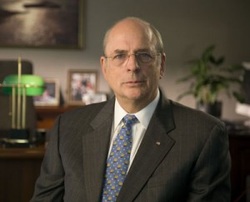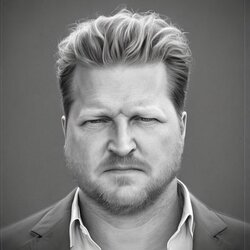 “The bottom line is that the things engineers do have consequences, both positive and negative, sometimes unintended, often widespread, and occasionally irreversible." -Norm Augustine Norm Augustine is one of the most innovative leaders in the world. Augustine’s name is not instantly recognizable to most people, but his work has affected millions. After a distinguished career that spans government, private enterprise, and non-profit organizations, Norm Augustine retired in 1997 as CEO of Lockheed Martin, the largest aerospace, defense, systems integration company in the world. Mr. Augustine’s accomplishments are legendary: Under Secretary of the Army, Office of Secretary of Defense (Engineering), Chairman of the American Red Cross, 17 honorary degrees, and president of the Boy Scouts of America. Augustine earned numerous awards, most recently the National Academy of Sciences 2006 Public Welfare Medal which honors his "contributions to the vitality of science in the United States by bringing to industry and government a better understanding of the crucial role that fundamental scientific research must play in our long-term security and economic prosperity." Despite his accomplishments, Augustine knows adversity: “the first rocket he worked on blew up after a flight of 250 milliseconds. The next one was canceled a week before its first flight. Augustine became CEO of a defense contractor, Martin Marietta Corp., just as the Berlin Wall--and Pentagon procurement spending--collapsed” (Crock, 1997). Augustine has seen the highs and lows of engineering projects and business, yet he remains humble and down to earth with a wry sense of humor. Accomplishments Lt Gen Michael M. Dunn, USAF, President, National Defense University introduced Norm Augustine at an awards ceremony noting that three characteristics among Augustine’s numerous accomplishments stand out: Scholarship, Excellence in Industry, and Public Service. Augustine is a scholar having written four books and dozens of articles. Upon retiring from Lockheed Martin he accepted a teaching position at his alma mater Princeton University demonstrating his commitment to STEM education and scholarship. Augustine was only the second person in his family to attend high school, and the first ever to go to college. Augustine explains personal experience fuels his dedication to education, “The chance to get that education made all the difference in the world to me, and I think we owe it to every young person in America to have the opportunity to get a first class education” (Pacesetter, 1997). Dunn describes Augustine as “captain of industry”, leading Lockheed Martin to Mission Success despite shrinking defense budgets and the collapse of the Cold War. In a 1995 interview Augustine discusses the state of the defense industry, “The major firms sell at a 30-percent discount to the S&P 500 index. The combined market value of the top four aerospace firms is less than that of McDonald’s, meaning that Big Macs and Egg McMuffins are judged by the market to have greater immediate reward than stealth aircraft and “smart” weapons.” Augustine notes the 70-percent decline in procurement spending since the mid-1980s and the decline of defense suppliers from 120,000 in 1985 to 30,000 in 1995. To combat the shrinking marketplace, Augustine recognized the need to consolidate and merge with competitors in the defense industry before it collapsed as a result of weaker competitors in the market. He calls this the Law of the Cross-Eyed Discus Thrower: “He may not win any gold medals, but he sure keeps the spectators on their toes.” Augustine revolutionized the defense industry, successfully navigating his organization to the top of the mountain. Lockheed Corporation and Martin Marietta merged and brought IBM Federal Systems, GE Aerospace, Loral Systems, and General Dynamics into the fold to form the greatest technology company ever created. Augustine worked on technology transfer techniques from commercial industry to defense. In the traditional model, defense spending allowed for research and techniques which then could be applied to commercial products and services. As defense budgets shrank, Augustine realized commercial projects rather than defense would take the leadership role in technology innovation. Augustine positioned his organization to work with simulation, commercial satellites, industrial navigation systems, and medical technologies. To date, Lockheed Martin has made successful inroads in the commercial market, namely in large scale systems integration. Keenly aware of global and industrial changes, Augustine says, “there are only two kinds of companies – those that are changing and those that are going out of business” (Augustine, 1997). Finally, Lt Gen Dunn recognizes Augustine’s work as a public servant in government by serving in positions such as the Office of the Secretary of Defense as an Assistant Director of Defense Research and Engineering, Assistant Secretary of the Army, then Under Secretary, and finally Acting Secretary of the Army. Augustine’s other notable public service positions include Chairman of the American Red Cross and Chairman of the Defense Policy Advisory Committee on Trade. Hobbies and Health "I love what I'm doing, and I haven't missed a meal in years," Augustine said in a 1991 Forbes interview. Despite working long hours, Augustine finds time to enjoy his hobbies. Fishing is one; another is building elaborate doll houses. Augustine is a well-traveled adventurer. He has dog-sledded in the Arctic and explored volcanoes in the Antarctic; backpacked in the Canadian and U.S. Rockies; horse-backed in the U.S. Rockies; sailed a tall ship in the West Indies and a stern wheeler up the Mississippi; traveled the Oregon Trail in a covered wagon; snorkeled on the Great Barrier Reef; boated the Amazon; hot-air ballooned in Africa; rafted the Grand Canyon; toured the Out-Back of Australia and the desert of Saudi Arabia; been on camera safari in Tanzania and Kenya; and photographed polar bears in the Northwest Territory. Augustine has been to both North and South poles. Some of his adventures are collected in his book “Augustine's Travels: A World-Class Leader Looks at Life, Business, and What It Takes to Succeed at Both.” Conclusion Norm Augustine fell into the defense industry by accident – a Princeton colleague suggested young Augustine change his major from geological engineering to aerospace engineering. Augustine had a career ambition of being a forest ranger; however he followed the colleague’s advice. Augustine rose to prominence for his insightful leadership, innovative management ideas, and commitment to ethics. Having successfully piloted a defense contractor through some of the worst defense spending reductions in history makes Augustine a legendary leader. Success, Innovation, Integrity – it’s the formula that makes Augustine’s Law. References
0 Comments
|
AuthorDirector Archives
January 2023
Categories
All
|
Photos from europeanspaceagency, ▓▒░ TORLEY ░▒▓, Lori_NY, Dean_Groom, dalecruse, Fin Cosplay & Amigurumi, Iain Farrell, erin_everlasting, palindrome6996, Easa Shamih (eEko) | P.h.o.t.o.g.r.a.p.h.y, markhillary, Matt McGee, Marc_Smith, woodleywonderworks, agustilopez, rachel_titiriga, SeaDave, cheri lucas., Caio H. Nunes, grabbingsand, Armchair Aviator, quinn.anya, Jennifer Kumar, billaday, edtechworkshop, chucknado, purpleslog, yugenro, christianeager, dground, GlasgowAmateur, expertinfantry, shixart1985 (CC BY 2.0), OiMax, Wilfried Martens Centre for European Studies, PEO, Assembled Chemical Weapons Alternatives, IBM Research, shixart1985, markus119, shixart1985, shixart1985, Wilfried Martens Centre for European Studies


 RSS Feed
RSS Feed
